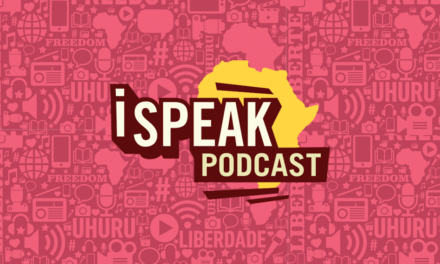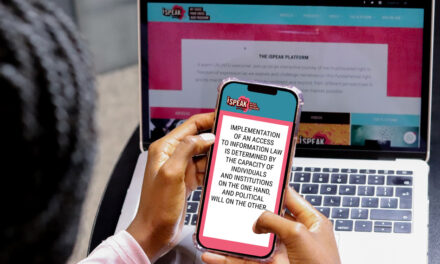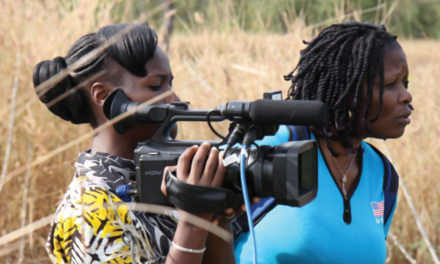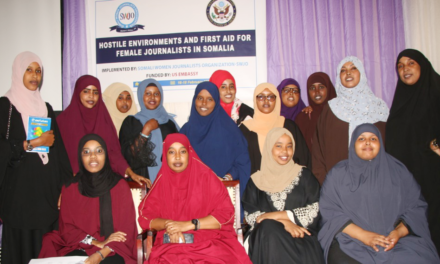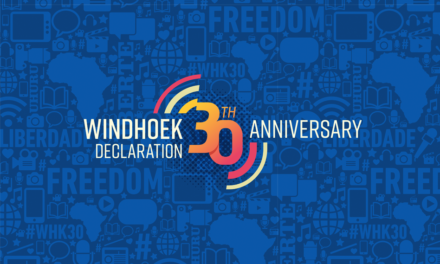
‘We must continue the battle’ – Samira Sabou
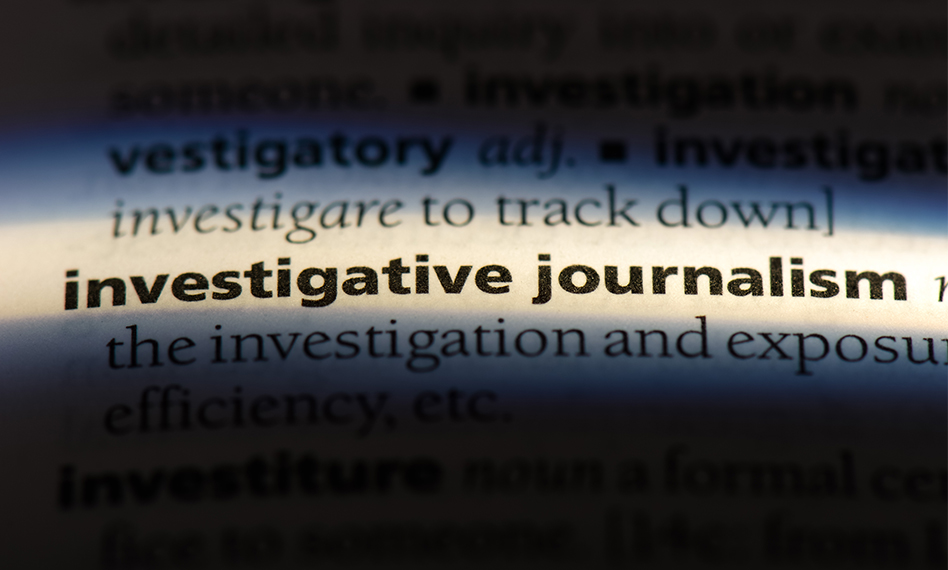
Samira Sabou is an award winning investigative journalist, blogger and media trainer from Niger. She is the president of the Niger Bloggers for Active Citizenship Association (ABCA). She is also the administrator of the Information, Economic and Social Development Information Magazine (MIDES).
In 2021 she was awarded the Index on Censorship Freedom of Expression Award.
Her sterling work in exposing corruption and speaking up has not come without costs. In 2019 she was detained for 48 days while she was pregnant, over a comment made by another person on her Facebook post. In May 2021 she was arrested and detained overnight for sharing a drug trafficking report which implicated certain government officials. Seven months later – in January 2022 – she was convicted of defamation and given a suspended sentence.
We speak to her about her journey and struggles as a journalist in Niger.
CAN you explain the media terrain in Niger? There are the traditional media such as television, radio and the newspapers – but the field I am in, which is online media, is not recognised [as media] in Niger.
Which is the most popular form of media in Niger?
I think community radio stations are still very popular. Television is not as popular as radio as it is not available in all regions of Niger – you have televisions stations that are mainly present in the capital, in Niamey, but not across the country. The only television station in Niger which covers all the eight regions of Niger is state broadcaster – The Office of Radio and Television of Niger (Office de radiodiffusion et Télévision du Niger ORTN). The other television stations only cover just two or three regions of the country.
What makes this form of media so popular?
I didn’t do any investigation, I didn’t do any studies, but in my honest opinion, the most popular medium today is social media. Because, compared to what I was telling you about traditional media, social media covers all eight regions of Niger. Social media allows the Nigerien diaspora to be aware of what is happening almost at that moment. As soon as an event happens, for example – an attack takes place somewhere in Niger – because of social media the reporting of such an incident can be quite quick. I believe it’s really social media that is the most popular media. As much as you have the poor, the rich, the rulers, the citizens, everyone is on it, even those who are not as literate or educated. On WhatsApp you can receive information through voice notes, therefore, you have a radio experience on WhatsApp. So for me, social media is the most popular today.
How did you get into journalism?
I have basic training in finance and banking, and worked as an intern at B.A. Niger Bank. After six months, I decided to turn to journalism, as I didn’t see myself as the right fit for number crunching. Journalism gave me this warmth I was looking for. I wanted to be in contact with people, to know their stories, to report their stories, to also change things through these stories that we tell, to contribute to alleviating certain social problems and to also understand the world around me. That’s how I got into journalism.
You are becoming well known for the training you are giving to investigative journalists on how to stay safe online. How did this come about?
In fact, I don’t train investigative journalists only, I give training to citizens in general. I sometimes give training at Abdou Moumouni University to communicators, lawyers and sociologists. Sometimes I give training just for bloggers. I teach on the ethical use of social media, and train on how to prevent possible arrests, in light of the cybercrime law which was passed in 2019. When the law was enacted, there was no sensitization on the part of the State, so, we are helping to popularise this law, informing the public about its pitfalls. I got into this through the association that I run, which is called the Association of Bloggers for Active Citizenship. We are actually mobilising funds with certain donors to help clean up the communications that are made on social media. As the Association of Bloggers for Active Citizenship, we work with certain representatives of state institutions, such as judges.
What has been the impact of this training?
The impact of these trainings is that the average citizen now understands that the law on cybercrime does not stop anyone from publishing their thoughts, but imposes duties such as not to defame, to respect certain principles of such as freedom of expression, the right to private life, and to respect the stability of state institutions. There is more awareness about the cybercrime law and on the rights of citizens, because we teach about this often. Through these trainings we share our experiences of how we have been in put prison and how we have challenged certain decisions of government. This is how we are lobbying for the modification of the law on cybercrime. We have empowered our students who now see clearly, because they are better equipped to work. It’s as if we put a light in a room that was pitch black. Together with 18 other organisations, we made a plea for the modification of the cybercrime law, which I am happy to say that yesterday (27 April), the Council of Ministers adopted the bill aimed at modifying this law on cybercrime. So these are the achievements.
Tell us about the initial problems you faced because of the work you do?
The first incident was when I was beaten up by a presidential guard in 2015, when I had gone out to buy bread. It really made me realize a lot of things about the situation in our country. I reported the incident, but because it was a presidential guard, the matter was not amply investigated. So in the end, I had to withdraw it. The second incident, was when the then President of the Republic – Mahamadou Issoufou went on an official visit to Australia, in 2017. He took a picture in a hotel, and we started to parody his pose. For a country which is very poor and for a President of the Republic to take pictures from a hotel, for us, it was unacceptable. So that was the second setback I suffered. I got kicked out of my job, where I was working for the government company – The National Publishing and Press Office. When I was fired, instead of cowering like I did when the presidential guard hit me, this time I stayed the course and sued the state for unfair dismissal. I actually won my case, was reinstated and the State was ordered to pay me damages.
Does this reflect the negative impact of Niger’s Cybercrime law?
Yes, it does and I will refer you to my 2020 arrest. There was a complaint which was filed by the son of the President Issoufou – Sani Issoufou Mahamadou, who was also chief of staff to the President of the Republic. On June 10, 2020, he filed a complaint against me for a post I put on social media. So when I appeared before the judge, I was charged with defamation. The judge decided to place me in a warrant of committal, even though I was pregnant. So I wasn’t released until 48 days later, after which I was found not guilty.
In 2021 you were arrested for sharing an article from an international NGO alleging the involvement of government officials in the drug trade. You along with Moussa Aksar where arrested and convicted under the cybercrime law. How did you feel about that conviction?
My colleague Moussa Aksar and I, were sentenced in January 2022 for defamation. I had also been charged with disturbing public order but the charge was dismissed, leaving the charge of violating the law on cybercrime. So you ask me how do I feel about this conviction. For me, it’s injustice, because I didn’t write the article – the words I republished were written by an NGO. So in a conscious state, I shouldn’t be condemned for someone else’s writings and moreover for defamation because the writings did not come from me. Even if it did not come from me. How can I be tried for defamation? What makes it worse was that the plaintiff Niger’s Central Office for the Repression of Illicit Trafficking (OCRTIS) withdrew the complaint. In all the jurisdictions of the world, once the plaintiff withdraws his complaint concerning defamation or insult, the complaint automatically falls away. In this case, despite the plaintiff stepping away, the state continued with the procedure through the prosecutor, which was totally illegal and which is really beyond comprehension.
Your case was mentioned in the Report to the Human Rights Council by Special Rapporteur on the situation of human rights defenders – Mary Lawlor. Does this mention improve the situation for journalists and human rights defenders in Niger?
Yes, I believe that any defender of human rights, in this case the United Nations, through the interpellation of Mrs. Mary Lawlor therefore, recognised certain inconsistencies in the law on cybercrime, in relation to my case. Thank God. As I told you earlier in one of my comments, there has indeed been a revision of this law on cybercrime. The state has requested that the law be reviewed and this will be done at the level of the National Assembly.
How did it feel winning an award for freedom of expression at the Index on Censorship Award?
I can tell you I often wonder why I do this job. In light of all the risks that we run, when we find ourselves in prison, when we find ourselves arrested, when we are called to come and respond to summons, when our houses are raided and searched by a cohort of police officers. I assure you, that you will often wonder but why am I doing this? But when we also see how people support us, when we go outside, when we do our shopping, when we are going to institutions for services. When we see how people appreciate our work, it really encourages us. In addition to that, when you are acknowledged outside Niger, in an English-speaking country thousands of kilometers from Niger – like London (England) – honestly, it’s a plus. It allows you to hold on, and it allows you to have hope. We then say to ourselves that we must continue the battle so that our countries are also countries of law, so that we can all benefit from the resources of our countries. That’s how I feel.
Do you think awards make up for the risk of being an investigative journalist?
No, I don’t think the awards equally compensate for the risks that you incur as an investigative journalist.
But it encourages us to keep at it. When you are an investigative journalist, let me tell you that often you lose a lot of things, such as your freedom, because of your reporting. We must take many precautions in our way of life, because we too must be beyond reproach. So there’s so much pressure too.
Often we lose our jobs and such was my case. And when you lose your job, it’s often very difficult for other organizations to hire you, because they’re also afraid of government reprisals. So the way we operate is that often you have to be a freelance journalist, as a means to get an income. Or else you have to find another income-generating activity to be able to live, because you don’t quite live from investigative journalism, you don’t necessarily live from that.

